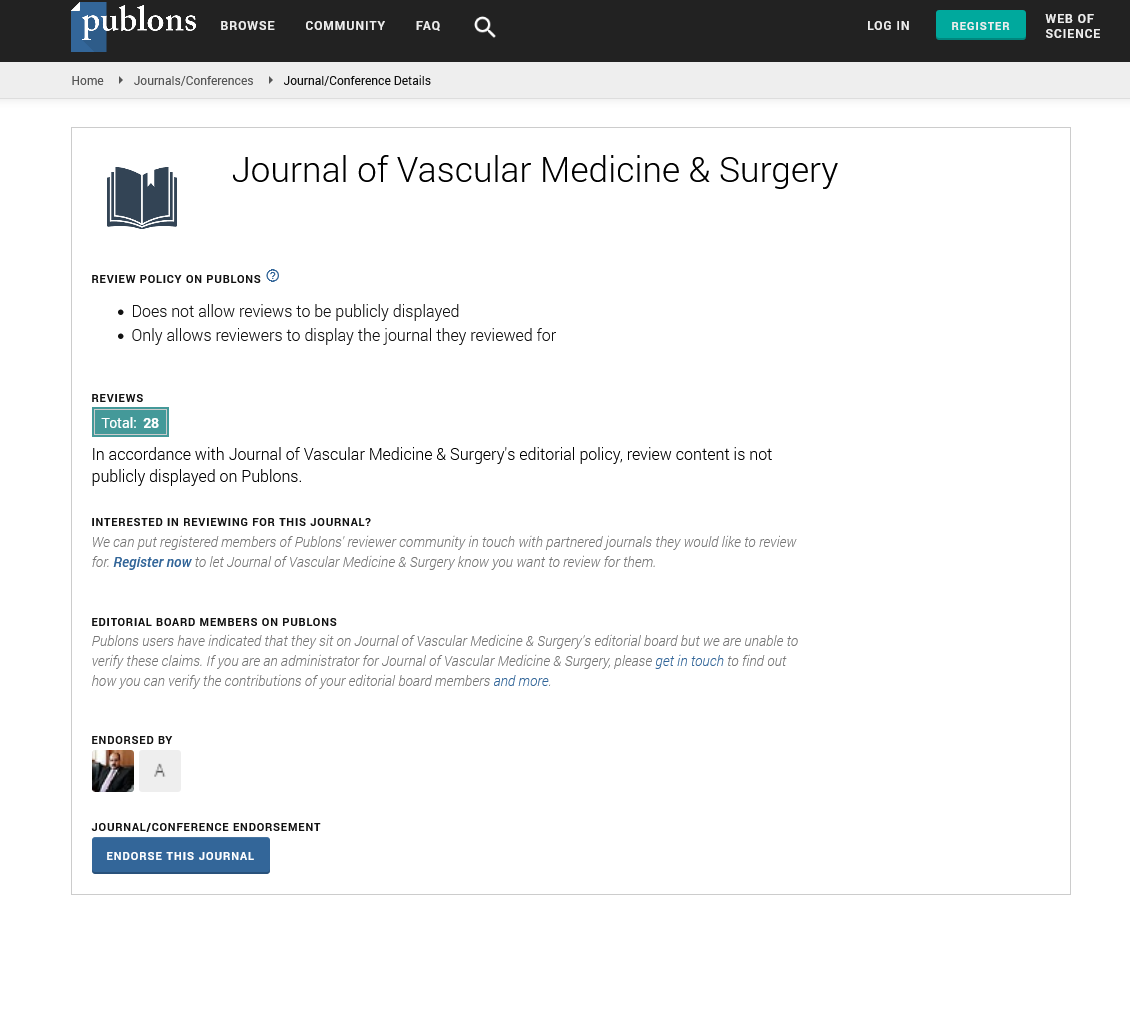Indexed In
- Open J Gate
- Academic Keys
- RefSeek
- Hamdard University
- EBSCO A-Z
- OCLC- WorldCat
- Publons
- Euro Pub
- Google Scholar
- SHERPA ROMEO
Useful Links
Share This Page
Journal Flyer

Open Access Journals
- Agri and Aquaculture
- Biochemistry
- Bioinformatics & Systems Biology
- Business & Management
- Chemistry
- Clinical Sciences
- Engineering
- Food & Nutrition
- General Science
- Genetics & Molecular Biology
- Immunology & Microbiology
- Medical Sciences
- Neuroscience & Psychology
- Nursing & Health Care
- Pharmaceutical Sciences
Commentary - (2021) Volume 0, Issue 0
Arrhythmias: Symptoms and Treatment
Raouf Khalil*Received: 04-Jun-2021 Published: 25-Jun-2021, DOI: 10.35248/2329-6925.21.s6.002
Abstract
An arrhythmia is a problem with the rate or rhythm of the heartbeat. During an arrhythmia, the heart can beat too fast, too slowly, or with an irregular rhythm. When a heart beats too fast, the condition is called tachycardia. When a heart beats too slowly, the condition is called bradycardia
Keywords
Arrhythmias; Bradycardia; Injury; Hereditary qualities
Symptoms
Arrhythmia probably won't cause recognizable side effects. Notwithstanding, a specialist may recognize an arrhythmia during a normal assessment or subsequent to mentioning an electrocardiogram (EKG).
Regardless of whether individual notification side effects, it doesn't really imply that they have an extreme arrhythmia.
A few groups with dangerous arrhythmias may have no side effects, while others with indications might not have an extreme arrhythmia.
Manifestations rely upon the kind of arrhythmia, as follows:
Indications of tachycardia
• Indications of a quick heartbeat include:
• Windedness Unsteadiness
• Blacking out or almost swooning
• Vacillating in the chest
• Chest torment
• Dazedness
• Unexpected shortcoming
• Indications of bradycardia
Symptoms of bradycardia
Bradycardia can cause the accompanying indications:
• Angina, or chest torment
• Inconvenience concentrating
• Disarray
• Discovering exercise more troublesome than expected
• Dazedness
• Sluggishness
• Unsteadiness
• Palpitations
• Windedness
• Swooning or almost blacking out
• Lavish perspiring
Symptoms of A-lie
At the point when A-lie indications happen, they frequently have a quick beginning and may include:
• Angina
• Shortness of breath
• Tipsiness
• Palpitations
• Swooning or almost blacking out
• Shortcoming
Treatment
Treatment for arrhythmia is just fundamental if the condition is expanding the danger of more extreme arrhythmia or an intricacy, or if the manifestations are serious.
The different arrhythmias require various medicines.
Treatment for bradycardia
On the off chance that bradycardia happens because of a hidden condition, a specialist should treat that condition first. In the event that they track down no hidden issue, the specialist may prompt embedding a pacemaker.
A pacemaker is a little gadget that a specialist puts under the skin of the chest or mid-region to help control strange heart rhythms. Pacemakers utilize electrical heartbeats to provoke the heart to pulsate at a customary least rate.
Treatment for tachycardia
There are a few unique medicines for tachycardia:
Vagal moves: Specific developments and activities that an individual can do at home may stop a few kinds of arrhythmia that beginning over the lower half of the heart.
Drugs: These won't fix an arrhythmia yet are normally viable in lessening the quantity of tachycardia scenes. A few prescriptions likewise advance electrical conduction through the heart.
Cardioversion: The specialist may utilize an electric stun or prescription to reset the heart to its customary mood.
Removal treatment: A specialist embeds at least one catheter into the inward heart. They place the catheters in spaces of the heart that they suspect might be the wellspring of the arrhythmia. The specialist wills then, at that point uses them to obliterate little areas of harmed tissue, which frequently revises the arrhythmia.
Implantable Cardioverter-Defibrillator (ICD): A specialist embeds this close to one side collarbone. The gadget then, at that point screens the heart musicality. In the event that it's anything but a curiously quick rate, it invigorates the heart to get back to its ordinary speed.
Labyrinth method: During the labyrinth strategy, a specialist makes a progression of careful entry points in the heart. These then, at that point mend into scars and structure hinders that guide the electrical motivations, assisting the heart with thumping effectively.
Ventricular aneurysm medical procedure: Sometimes, an aneurysm, or lump, in a vein that prompts the heart can cause arrhythmia. On the off chance that different medicines are not compelling, a specialist may need to eliminate the aneurysm.
Coronary detour a medical procedure: A specialist unites corridors or veins from somewhere else in the body on to the coronary courses. These aides the dissemination sidestep any districts that have gotten tight and improve the blood supply to the heart muscle.
Citation: Khalil R (2021) Arrhythmias: Symptoms and Treatment. J Vasc Med Surg. S6:002.
Copyright: © 2021 Khalil R. This is an open-access article distributed under the terms of the Creative Commons Attribution License, which permits unrestricted use, distribution, and reproduction in any medium, provided the original author and source are credited.

